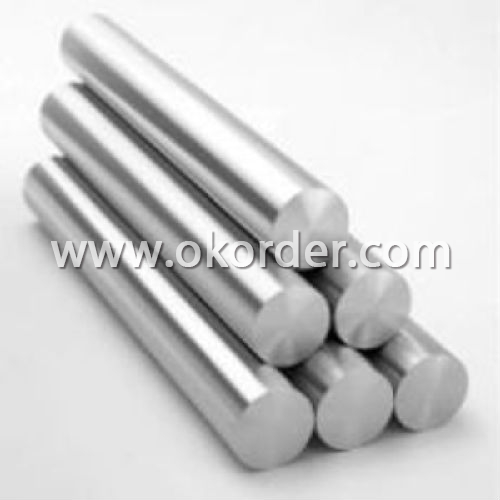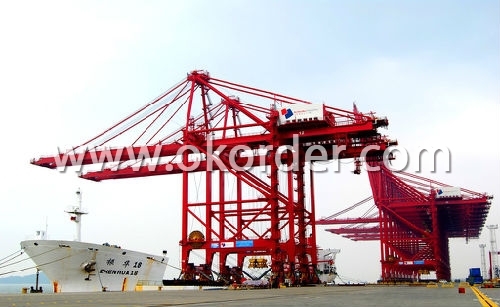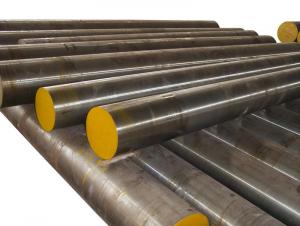Hot Rolled Bearing Steel Bar with High Quality for Construction
- Loading Port:
- China main port
- Payment Terms:
- TT or LC
- Min Order Qty:
- 25000 m.t.
- Supply Capability:
- 100000 m.t./month
OKorder Service Pledge
OKorder Financial Service
You Might Also Like
Specifications of Hot Rolled Bearing Steel Bar GCr15 with High Quality for Construction:
1. Dimensional sizes: Thickness: 14~100mm.Length:3000~5800mm,Diameter :14-500mm
2.Chemical composition:
C | Si | Mn | Cr | Ni | Cu |
Equal or less than | |||||
0.95-1.05 | 0.15-0.35 | 0.20-0.40 | Cr:1.30-1.65 | 0.30 | 0.25 |
3. Grade: SAE51200/ GCr15 / 100cr6
4. Heat Treatment:
Soft annealing: heat to 680-720°C, cool slowly.
Hardness after annealing: Max. 241 HB
Hardening: 820 - 850 °C
Normalizing temperature: 840-880°C
Tempering: 540-680°C
5. Surface requirements: Black, grinding, bright, polish
6. Characters:
1) Comprehensive properties
2) Good performance in cutting and processing after spheroids annealing
3) High hardness and homogenization after quenching and tempering
4) High abrasive resistance and fatigue resistance
7. Payment terms: T/T or L/C at sight
Usage & Applications of Hot Rolled Bearing Steel Bar GCr15 with High Quality for Construction:
Our products have been used in all kinds of areas, such as aviation, aerospace, navigation, nuclear, energy, chemical industry, electronic information, petrochemical, automotive, instrument and meter, Communication ,transportation, and medical instruments, etc. Bearing ring,steel rolling mill ,machinery, 100Cr6 bearing steel ball is widely used in high-speed and low-noise bearing, bicycle, motorcycle, automobile, bags, electronics.
Packaging & Delivery of Hot Rolled Bearing Steel Bar GCr15 with High Quality for Construction:
Mark: Heat No. will be cold stamped and Steel grade, diameter (mm), length (mm), and the manufacturer LOGO and weight (kg) is painted.
Standard seaworthy packing or as customer required
Delivery time: Within 30 days after order is confirmed.
FAQ:
Q1: Why buy Materials & Equipment from OKorder.com?
A1: All products offered byOKorder.com are carefully selected from China's most reliable manufacturing enterprises. Through its ISO certifications, OKorder.com adheres to the highest standards and a commitment to supply chain safety and customer satisfaction.
Q2: How do we guarantee the quality of our products?
A2: We have established an advanced quality management system which conducts strict quality tests at every step, from raw materials to the final product. At the same time, we provide extensive follow-up service assurances as required.
Q3: How soon can we receive the product after purchase?
A3: Within three days of placing an order, we will begin production. The specific shipping date is dependent upon international and government factors, but is typically 7 to 10 workdays.
Images:


Note:
1. According to national standard (GB) for our products, if not, supply according to national standards (GB) or agreement.
2. We can not only provide electric furnace +LF+VD and electro-slag re-melting (ESR)steel forging materials, but also forging products of piece, bar, etc.
3. Our company is equipped with roll equipment and can provide our customers with roll billets or finished.
4. Please send us your detailed specifications when inquire. We will reply to you ASAP.
- Q:How does special steel perform in high-speed applications?
- Special steel is specifically designed to perform exceptionally well in high-speed applications. Its unique composition and manufacturing process make it highly resistant to heat, wear, and fatigue, allowing it to withstand the extreme conditions often encountered in high-speed operations. One of the key properties of special steel that makes it ideal for high-speed applications is its high strength-to-weight ratio. This means that it can maintain its structural integrity and withstand heavy loads while being lightweight, enabling it to efficiently handle the demands of high-speed operations. Additionally, special steel possesses excellent heat resistance, which is crucial in high-speed applications where temperatures can rise significantly. It has a high melting point and can maintain its strength and hardness even at elevated temperatures, preventing deformations or failures that could occur with other materials. Furthermore, special steel's exceptional wear resistance ensures long-lasting performance in high-speed applications. It is able to withstand the continuous friction and abrasive forces that occur at high speeds, reducing the need for frequent replacements and improving overall efficiency. Moreover, special steel's resistance to fatigue is another important factor in its performance in high-speed applications. It can withstand repetitive loading and cyclic stresses without developing cracks or fractures, ensuring a longer service life and minimizing the risk of sudden failures. In summary, special steel is specifically engineered to excel in high-speed applications. Its high strength-to-weight ratio, heat resistance, wear resistance, and fatigue resistance make it an ideal choice for industries such as aerospace, automotive, and manufacturing, where high-speed operations are common. Its superior performance in these applications ensures reliable and efficient performance, contributing to enhanced productivity and safety.
- Q:What are the requirements for special steel used in high-strength applications?
- To ensure the performance and durability of special steel used in high-strength applications, specific requirements must be met. These requirements encompass various factors: 1. High tensile strength is crucial in withstanding heavy loads and resisting deformation. It enables the steel to endure greater stresses without failure. 2. Excellent toughness is essential as it allows the steel to absorb energy and resist fracture. This prevents sudden and catastrophic failure under impact or dynamic loading conditions. 3. Superior hardness is necessary to resist wear, abrasion, and indentation. It ensures that the material maintains its structural integrity and performance even in extreme conditions. 4. Good ductility is important alongside high tensile strength. It allows the steel to undergo plastic deformation without fracturing, making it suitable for forming or shaping during manufacturing. 5. Resistance to corrosion is vital to prevent degradation caused by moisture, chemicals, or harsh environments. This ensures the longevity and reliability of the steel in various conditions. 6. Heat resistance is required for applications involving high temperatures. It allows the steel to maintain its mechanical properties and structural stability under elevated temperatures. 7. Controlled alloying elements, such as chromium, molybdenum, nickel, or vanadium, are often added to enhance the steel's strength, toughness, hardness, and other desired properties. 8. Precise composition and microstructure are necessary to ensure consistent and predictable mechanical properties. This can be achieved through precise manufacturing processes like controlled cooling rates or heat treatments. By meeting these requirements, special steel used in high-strength applications can endure the demanding conditions it faces, providing reliable performance, longevity, and safety.
- Q:Can special steel be machined easily?
- No, special steel is generally not easy to machine due to its higher hardness and strength compared to regular steel.
- Q:What are the main industries that use special steel?
- Special steel is extensively utilized in various industries due to its exceptional properties and characteristics. The following sectors heavily depend on special steel: 1. Automotive Industry: Numerous automotive components, including engine parts, transmission gears, suspension systems, and exhaust systems, rely heavily on special steel. Its outstanding strength, durability, and resistance to wear and corrosion make it an ideal choice for these applications. 2. Aerospace Industry: The aerospace industry highly values special steel as it is essential in the production of aircraft components such as turbine blades, landing gears, and structural parts. The unique properties of special steel, including high temperature resistance, strength, and lightweight nature, play a crucial role in ensuring the safety and efficiency of aerospace systems. 3. Energy and Power Generation: Special steel finds extensive applications in the energy sector, particularly in power plants and nuclear facilities. Turbines, generators, and heat exchangers are constructed using special steel, where its exceptional strength and high temperature resistance are vital for efficient energy production. 4. Oil and Gas Industry: In the oil and gas sector, special steel is widely employed in drilling equipment, pipelines, valves, and other components. The ability of special steel to resist corrosion, withstand extreme conditions, and provide high strength makes it the preferred choice in this industry. 5. Construction and Infrastructure: Special steel is crucial in the construction industry for various purposes, including building structures, bridges, and high-rise buildings. Its high tensile strength, durability, and resistance to impact and corrosion ensure the integrity and longevity of these structures. 6. Tool and Die Making: Special steel is extensively used in the manufacturing of tools and dies for various industrial processes. Its hardness, toughness, and wear resistance make it an ideal material for applications such as cutting, drilling, and shaping metals. 7. Defense and Military: The defense and military sector heavily relies on special steel for the production of armored vehicles, weapons, and other military equipment. Special steel's ability to withstand high impacts, resist ballistic penetration, and maintain structural integrity under extreme conditions is crucial for ensuring the safety and effectiveness of military operations. In conclusion, the automotive, aerospace, energy and power generation, oil and gas, construction and infrastructure, tool and die making, and defense and military industries heavily depend on special steel. These industries benefit greatly from the unique properties of special steel, including high strength, durability, resistance to wear and corrosion, and the ability to withstand extreme conditions.
- Q:How does special steel behave under different types of loading conditions?
- Special steel, also referred to as alloy steel, displays distinctive characteristics when subjected to different types of loads. It is specifically engineered to possess exceptional mechanical properties, rendering it suitable for a diverse range of applications where high strength, toughness, and resistance to wear or corrosion are necessary. Under tension loading, special steel demonstrates remarkable tensile strength and ductility, allowing it to endure pulling forces without easily fracturing. This property makes it ideal for applications where components are exposed to pulling or stretching forces, such as cables, structural elements, or automotive parts. When subjected to compressive loading, special steel showcases its exceptional ability to withstand forces that attempt to squeeze or press it together. This renders it suitable for applications like hydraulic cylinders, crankshafts, or flanges, where resistance to compression is essential. In terms of bending or flexural loading, special steel exhibits outstanding flexibility while retaining its strength, enabling it to endure repeated bending without deformation or failure. This property is particularly advantageous in applications involving springs, suspension systems, or beams exposed to dynamic loads. Special steel also possesses excellent fatigue resistance, which means it can endure cyclic loading or repeated stress without failure. This property is crucial in applications subjected to continuous or repetitive loading, such as turbine blades, gears, or axles. Furthermore, special steel effectively handles impact loading due to its high toughness and impact resistance. This makes it suitable for applications where sudden shocks or impacts are anticipated, such as hammer heads, drill bits, or armor plating. In terms of temperature loading, special steel retains its mechanical properties even at high temperatures due to its exceptional heat resistance. This property makes it suitable for applications exposed to extreme heat or thermal cycling, such as turbine components, exhaust systems, or molds utilized in metal casting. To summarize, special steel exhibits different behaviors under various loading conditions, adapting its mechanical properties to meet the specific requirements of each application. Its unique combination of strength, toughness, ductility, and resistance to wear or corrosion make it a versatile material capable of enduring different types of loading conditions.
- Q:Can special steel be used for making aerospace engine components?
- Certainly, aerospace engine components can be made using special steel. The aerospace industry commonly utilizes special steel alloys, such as nickel-based superalloys and stainless steels, due to their remarkable mechanical properties, ability to withstand high temperatures, and superior resistance to corrosion. These alloys are specifically engineered to endure the extreme conditions and demands of aerospace engines, including high temperatures, pressures, and stress levels. Moreover, special steel alloys offer a high strength-to-weight ratio, which is crucial in reducing the weight of aerospace components while preserving their structural integrity. Consequently, the utilization of special steel in aerospace engine components ensures the dependability, performance, and safety of engines in aeronautical applications.
- Q:What are the different methods for improving the electrical conductivity of special steel?
- Special steel can have improved electrical conductivity through various methods. One common approach involves adding alloying elements like copper or silver, which increase the number of free electrons in the steel, thereby enhancing its electrical conductivity. Another option is subjecting the steel to heat treatment processes like annealing or normalizing. These heat treatments refine the steel's microstructure, reducing impurities and promoting electron movement. Surface treatments, such as electroplating or coating the steel with conductive materials like copper or nickel, also enhance its electrical conductivity. These treatments create a conductive layer on the steel's surface, facilitating better electron flow. Furthermore, refining the steel's grain size through techniques like grain boundary engineering or severe plastic deformation can improve its electrical conductivity. Smaller grain sizes enable more efficient electron movement and minimize scattering, resulting in improved conductivity. Lastly, proper cleaning and removal of surface contaminants or oxides significantly enhance the electrical conductivity of special steel. By eliminating impurities and ensuring a clean surface, the steel can establish better contact and conductivity. It is important to consider that the specific method chosen to improve the electrical conductivity of special steel depends on the intended application and the desired level of conductivity. Different industries and applications may require tailored approaches to achieve the desired outcomes.
- Q:What are the different methods for improving the creep resistance of special steel?
- There are several methods for improving the creep resistance of special steel. One approach is through alloying, where elements such as chromium, molybdenum, and tungsten are added to enhance the strength and stability of the steel at high temperatures. Another method is by heat treatment, which involves controlled heating and cooling processes to optimize the microstructure of the steel and improve its creep resistance. Additionally, surface treatments like carburizing or nitriding can be applied to increase the hardness and wear resistance of the steel, thereby improving its creep resistance. Lastly, proper design and engineering considerations, such as using thicker sections or incorporating reinforcements, can also contribute to enhancing the creep resistance of special steel.
- Q:What are the different surface treatments for special steel?
- For special steel, there exist various surface treatments that serve distinct purposes and offer unique benefits. Some commonly employed surface treatments include: 1. Galvanization, which entails coating the steel with a layer of zinc, providing exceptional corrosion resistance. Galvanization proves popular for outdoor applications exposed to moisture and harsh environmental conditions. 2. Powder coating, involving the application of a dry powder to the steel surface, which is then heated and cured to form a durable and protective coating. This treatment offers excellent resistance against corrosion, chemicals, and UV rays, making it ideal for automotive parts, appliances, and outdoor furniture. 3. Nitriding, a surface hardening treatment that diffuses nitrogen into the steel surface. Nitriding significantly enhances surface hardness, wear resistance, and fatigue strength. It finds common use in high-performance components like gears, crankshafts, and injection molding screws. 4. Electroplating, where a layer of metal such as chromium, nickel, or gold is deposited onto the steel surface through an electrochemical process. This treatment improves appearance, corrosion resistance, and wear resistance. Electroplating is often employed for decorative purposes or to enhance component performance in various industries. 5. Passivation, a chemical treatment that eliminates iron contaminants from the steel surface, creating a passive oxide layer. This layer acts as a barrier against corrosion, enhancing resistance to rust and other forms of degradation. Passivation is commonly used for stainless steel components in industries like food processing, pharmaceuticals, and medical devices. 6. Carbonitriding, a surface treatment that introduces carbon and nitrogen into the steel surface at high temperatures. This process forms a hardened case, improving wear resistance and fatigue strength. Carbonitriding finds frequent application in high-stress components such as gears, crankshafts, and camshafts. These examples represent just a fraction of the available surface treatments for special steel. The choice of treatment depends on factors like desired properties, application requirements, and budget constraints. Consulting experts or manufacturers is crucial for determining the most suitable surface treatment for specific steel applications.
- Q:Can special steel be used in extreme weather conditions?
- Yes, special steel can be used in extreme weather conditions. Specialized steel alloys such as stainless steel or weathering steel are designed to withstand harsh environments, including extreme temperatures, high humidity, corrosive elements, and exposure to UV radiation. These steels offer enhanced durability, resistance to corrosion, and excellent structural integrity, making them suitable for various applications in extreme weather conditions.
1. Manufacturer Overview |
|
|---|---|
| Location | |
| Year Established | |
| Annual Output Value | |
| Main Markets | |
| Company Certifications | |
2. Manufacturer Certificates |
|
|---|---|
| a) Certification Name | |
| Range | |
| Reference | |
| Validity Period | |
3. Manufacturer Capability |
|
|---|---|
| a)Trade Capacity | |
| Nearest Port | |
| Export Percentage | |
| No.of Employees in Trade Department | |
| Language Spoken: | |
| b)Factory Information | |
| Factory Size: | |
| No. of Production Lines | |
| Contract Manufacturing | |
| Product Price Range | |
Send your message to us
Hot Rolled Bearing Steel Bar with High Quality for Construction
- Loading Port:
- China main port
- Payment Terms:
- TT or LC
- Min Order Qty:
- 25000 m.t.
- Supply Capability:
- 100000 m.t./month
OKorder Service Pledge
OKorder Financial Service
Similar products
New products
Hot products
Related keywords





























